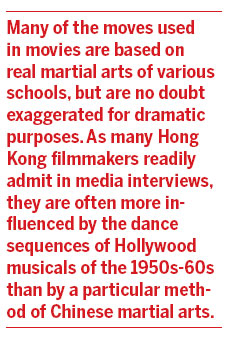Steering swordplay
Updated: 2013-01-11 10:39
By Raymond Zhou (China Daily)
|
|||||||||||
Fighting for what?
Martial artists fight for a cause. There are arguments that this is where the Chinese spirit shines. In my mind, the principles embodied by these brave souls are strikingly similar to those in other genres, especially the Hollywood western.
Naturally, Chinese heroes come in all stripes and may have faith in any of the religions and sects popular in China, such as Taoism, Buddhism, Confucianism or a blend of these and local variants. Redressing wrongs and seeking justice are frequent motives.
Most wuxia heroes have humble upbringings, which endear them to the masses but alienate them from the literati. They are rebellious by nature, which runs against the official orthodoxy of Confucianism. The literary genre of wuxia was often banned by the powers-that-be, chiefly because it tends to inspire a collective sense of disobedience.
Wuxia heroes place their sympathies with the weak and downtrodden. Their stories often start with a tragedy that remind them of the vulnerability and agonies of being powerless, corporal, mental or official. Act One usually ends with them leaving their homeland in search of more martial skills. Act Two portrays them as wanderers, who encounter mysterious masters and rigorously learn the tricks that will eventually empower them in their fight with the representatives of evil.
Related: Even martial-arts films face competition in the West
Sometimes, xia does not have a vested interest in the good-vs-evil standoff. He or she happens to come by, a la a cowboy sauntering into town, and witness an act of injustice. This dissociation from the crowds makes them pure bystanders whose righteousness determines the final result.
While the search for an English equivalent for xia is futile, I feel "maverick" may be the closest in capturing the strong sense of independence often embodied by this loner type.
 |
In China, the family is the basic societal unit. When the emperor punishes an underling, it is not the death sentence that is the harshest. His whole family could be put to death - including even distant relatives. This kind of guilt by family connection deters most people from standing up for justice. It has to be a whole village or even larger assembly that gets organized and together faces the ultimate consequence of insurgence.
That makes the odd person who stands up to authorities a target of secret admiration - and probably of public ridicule if it happens in real life. These figures are often detached from the web of family associations. In fiction, they are usually portrayed as having no past, which, if you think of it, is the Chinese equivalent of having a mysterious past or a double identity, such as Bruce Wayne-cum-Batman.
In terms of existing religion, xia tends to gravitate toward Taoism rather than Confucianism. Taoism advocates freedom from worldly pursuits and disdains the lure of officialdom, but Confucian promoters seek to work from within the establishment to address social ills. In reality, Taoists tend to excel in art and literature, and the wuxia canon imposes a physical prowess onto them.
Related Stories
Foreign films lead Chinese box office 2013-01-10 13:46
'Lincoln' leads BAFTA film nominations with 10 2013-01-10 10:15
Film criticism not justified 2013-01-10 07:15
Even martial-arts films face competition in the West 2013-01-11 07:30
Micro Film Competition accepting submissions 2013-01-09 21:37
China is world's 2nd largest film market 2013-01-09 19:00
Today's Top News
Police continue manhunt for 2nd bombing suspect
H7N9 flu transmission studied
8% growth predicted for Q2
Nuke reactor gets foreign contract
First couple on Time's list of most influential
'Green' awareness levels drop in Beijing
Palace Museum spruces up
Trading channels 'need to broaden'
Hot Topics
Lunar probe , China growth forecasts, Emission rules get tougher, China seen through 'colored lens', International board,
Editor's Picks

|

|

|

|

|

|






